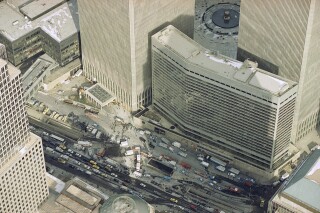Today in History: February 26, World Trade Center bombed in 1993

Manhattan’s West Street is jammed with police and emergency service vehicles in the aftermath of yesterday’s explosion that rocked New York’s World Trade Center’s twin towers and the Vista Hotel, foreground right, Feb. 27, 1993, causing evacuation of the financial center. Officials all but confirmed that a bomb caused the huge blast that left at least five people dead and injured hundreds. (AP Photo/Mike Derer)
Today in History:
On Feb. 26, 1993, a truck bomb built by Islamic extremists exploded in the parking garage of the North Tower of New York’s World Trade Center, killing six people and injuring more than 1,000 others. (The bomb failed to topple the North Tower into the South Tower, as the terrorists had hoped; both structures were destroyed in the 9/11 attack eight years later.)
On this date:
In 1815, Napoleon Bonaparte escaped from exile on the Island of Elba and headed back to France in a bid to regain power.
In 1904, the United States and Panama proclaimed a treaty under which the U.S. agreed to undertake efforts to build a ship canal across the Panama isthmus.
In 1942, “How Green Was My Valley” won the Academy Award for Best Picture of 1941, beating out nine other films, including “The Maltese Falcon” and “Citizen Kane.”
In 1945, authorities ordered a midnight curfew at nightclubs, bars and other places of entertainment across the nation.
In 1952, Prime Minister Winston Churchill announced that Britain had developed its own atomic bomb.
In 1966, South Korean troops sent to fight in the Vietnam War massacred at least 380 civilians in Go Dai hamlet.
In 1987, the Tower Commission, which had probed the Iran-Contra affair, issued its report, which rebuked President Ronald Reagan for failing to control his national security staff.
In 1998, a jury in Amarillo, Texas, rejected an $11 million lawsuit brought by Texas cattlemen who blamed Oprah Winfrey’s talk show for a price fall after a segment on food safety that included a discussion about mad cow disease.
In 2005, Egyptian President Hosni Mubarak ordered his country’s constitution changed to allow presidential challengers in an upcoming fall election.
In 2012, Trayvon Martin, 17, was shot to death in Sanford, Florida, during an altercation with neighborhood watch volunteer George Zimmerman, who said he acted in self-defense. (Zimmerman was later acquitted of second-degree murder.)
In 2013, a hot air balloon burst into flames during a sunrise flight over the ancient Egyptian city of Luxor and then plummeted 1,000 feet to earth, killing 19 tourists.
In 2014, Republican Arizona Gov. Jan Brewer vetoed a bill pushed by social conservatives that would have allowed people with sincerely held religious beliefs to refuse to serve gays.
In 2016, New Jersey Gov. Chris Christie stunned the Republican establishment by endorsing Donald Trump for president.
In 2017, At the Academy Awards, “Moonlight,” an LGBT coming of age drama, won three Oscars, including best picture of 2016 (in a startling gaffe, the musical “La La Land” was mistakenly announced as the best picture winner before the error was corrected).
In 2018, President Donald Trump, who had been highly critical of the law enforcement response to the Florida school shooting, told a roomful of governors at the White House that if he had been there, he would have rushed in, unarmed.
In 2020, the World Health Organization reported that the number of new coronavirus cases outside China had exceeded the number of new infections in China for the first time.
